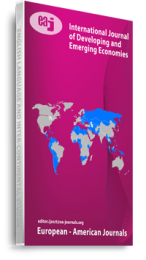The study examined the impact of export trade on economic performance in Nigeria, from 1986 to 2022. The variables used in this study comprised of real gross domestic product as a dependent variable, while oil exports, non-oil exports, exchange rate and trade openness are the explanatory variables. The employed variables have different order of integration ranging from zero and one, which led to the application of auto-regressive distributed lag (ARDL) model as the method of analysis. The ARDL model investigated long-run and short-run interactions among the variables. The results showed evidence of co-integrating equations amongst the variables. Hence, it was found that oil exports have significant positive impact on economic performance in Nigeria in both short-run and long-run. Non-oil exports exerted positive and significant influence on economic performance in Nigeria in both short-run and long-run. Based on the findings, the study recommended that Nigerian government should make judicious use of proceeds from export of crude oil to diversify other productive sectors of the economy. Again, the activities of non-oil sectors like agriculture, industry, etc., should be stimulated to enhance non-oil exports in Nigeria.
Keywords: Exports, Nigeria, Non-Oil Export, oil export, output performance

